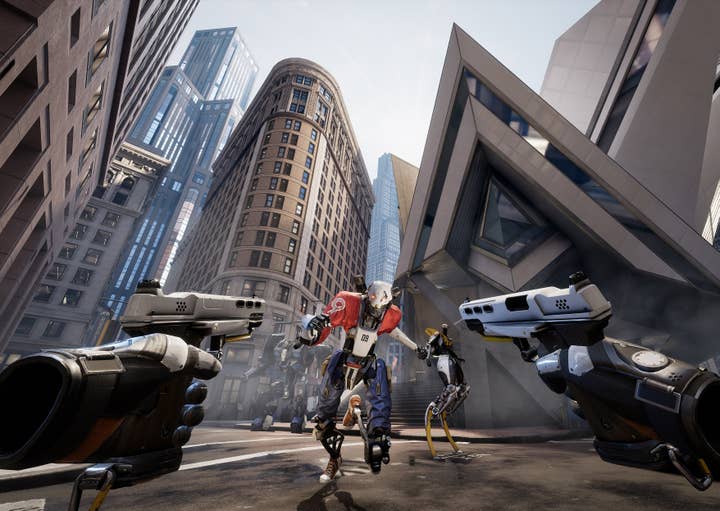Sweeney: “The future of the games industry? Make everyone a creator”
The Epic Games CEO discusses the importance of open platforms, the benefits of non-games projects and why he's preserving a forest
His principal competitor opens every keynote by stressing a commitment to the democratisation of games development, but it's an ethos Tim Sweeney is also a fervent believer in.
The CEO of Epic Game may not be as explicit about this philosophy when delivering presentations as Unity's John Riccitiello, but his well-known stance on the need for open games platforms and marketplaces, his decision to make both Unreal Engine 4 and its source code free, and extending that strategy to latest release Robo Recall, all paint a picture of a man who is determined to enable one thing: more people making games.
Speaking to me at GDC 2017, Sweeney points to efforts to lower the barriers to entry, not only in games development, but across all forms of art. Consumers don't even have to go to specialised tools - they may already have sown the seeds of their game design career on their PC or console.

"Minecraft brought about 100m people in, initially as gamers but all of them became digital content creators designing and building 3D scenes. I think that's the future of the industry: make everyone a creator.
"Just like YouTube has made everyone a video creator and Instagram has made everyone a photographer," said Sweeney, "we need to empower users to create this stuff because future [game] worlds are going to be so large that we can't possibly expect any game developer to create everything."
Equipping a wider range of people to build new games and digital experiences, he goes on to say, is something that will prove crucial to providing the software needed to drive virtual reality forward. The much hyped, heavily invested technology has left much of the industry divided over its potential, especially after last year's long-awaited launch of multiple commercial devices such as Oculus Rift and PlayStation VR struggled to deliver the sales momentum some expected.
At the end of this year's State of Unreal presentation, Epic Games announced that its Oculus-funded FPS Robo Recall was not only available to download for free, but comes with full modding support and access to the source code. The reason, Sweeney says, was so that aspiring VR developers or those struggling to get to grips with the technology can look under the hood and see how the game was created. This understanding should help them create appealing VR games of their own.
"Robo Recall brings Epic's touch to VR with an incredibly visceral action game experience," says Sweeney. "We built Unreal Tournament and Gears of War, and Robo Recall projects that onto VR. Both because we love the idea of building a cool game like that, but also to show developers how to pick up a lot of these techniques. That's why we're releasing Robo Recall with a complete modding kit and full source code so other developers can try to pick up on it.
"If we can help bring killer apps to VR, that's going to help the high-end VR audience grow from about 2m today to the next 10m"
Tim Sweeney, Epic Games
"I think it's going to be one of the first games that feels like a core shooter while integrating perfectly with all of the idioms you expect from VR. If we can help bring killer apps to VR, I think that's going to be the next step that helps the high-end VR audience grow from about two million today to the next ten million."
Of course, for every creator to achieve their true potential, the industry needs to provide open marketplaces through which they can reach their audience - something Sweeney has spoken out about at length. His well-publicised criticisms of Microsoft and its Universal Windows Platform have established him as a key proponent for accessible ecosystems, and this is further reflected in Unreal's continued dedication to the revised business it launched three years ago: making its engine available initially for a low fee and later free, and with its source code laid bare for all to see. Everyone from major AAA developers to bedroom coders are able to get to grips with the same tools behind Gears of War and countless other blockbusters - albeit with the proviso of a 5% royalties fee if they release something commercially.

"We've designed our business in a way where we benefit from customer success and nothing else," Sweeney stresses. "It's the most honest model you can design for a business because it incentivises us to do exactly what benefits our customers and dissuades us from anything else.
"You increasingly find a number of the larger tech companies have business models that are directly at odds with their customers."
Tim Sweeney, Epic Games
"You increasingly find a number of the larger tech companies have business models that are directly at odds with their customers. Instead of selling them software that they value, they're giving them software and extracting value through intrusions into their privacy or advertising that just detracts from their product's user experience. But our business model is we give everybody the engine. If you release a game, we ask for 5% of the gross revenue from the project. Some people say 'why does Epic want a cut of my game?' and it's because we're providing you with this engine and we've aligned our interest with yours.
"If you look at what that incentivises us to do, it incentivises us to help you succeed as much as you can and we do an awful lot to help developers of all sizes throughout the industry, both in supporting them directly and providing them with all the tools and benefits they need: full source code, complete tools, no barriers to entry."
Over the past few years, Epic has been working with more than just games developers to promote the powers of Unreal Engine. This year's State of Unreal was a prime showcase for its Enterprise projects, with performance capture expert Andy Serkis, Chevrolet and the team behind Rogue One: A Star Wars Story all discussing how they have used the tech to enhance their work. This, Sweeney says, is not just about getting some high-profile names on stage - these collaborations actually help improve the engine for its use in games.
"These industries have always used computer graphics and so they're fairly knowledgeable about the medium," he says. "Working with them has been really enlightening as to the incredibly high expectations of quality and realism that they have.
"For example, working with McLaren, we had to recreate anisotropic paint that looked exactly like the car, as well as highly complex reflective carbon fibre material. That's pushed us in new directions. Game developers have always been able to cheat because if we can't render a particular type of object very well, we just won't render that and make something else instead. But they pushed us to solve all of these hard problems on their behalf. And these companies are hiring game developers."
He goes on to use Epic's partnership with Chevrolet as a further example. The two companies worked together on a short film, The Human Race, that shows a racing driver competing with an AI controlled car. Depending on the shot, anything from the vehicles to the entire environment is being rendered in Unreal - a fact demonstrated on stage as someone used a companion app on a tablet to instantly change the vehicle seen in the film, looped on a screen above them. Working with firms on live action projects and photo-realism is also designed to help improve the visual quality of games rendered with future iterations of the Unreal Engine.
"Game developers have the ability to cheat. But the work we're doing now has to match up to reality, and there are no ways we can cut corners"
Tim Sweeney, Epic Games
"As I said earlier, game developers have the ability to cheat," says Sweeney. "When devs couldn't render realistic hair in Unreal Engine 2, we saw a lot of bald characters and people in hats - developers just work around those things. But the work we're doing now has to match up to reality, and there are no ways we can cut corners. We've had to put complete rigorous support for photo-real rendering, and all types of real-world rendering. All games immediately benefit from that.
"All of these examples also highlight some of the possibilities for AR in the future. Augmented and mixed reality are about combining computer images with real-world scenes, and there's an incredible amount of work that has to be done to make their lighting, shadows, visual appearance and camera effects all agree and appear to the viewer as a compelling, realistic image."
Epic Games' chief technology officer Kim Libreri is also in the room with us and points out that the popularity of Pokémon Go - which, while not reliant on AR, has certainly helped popularise the tech - has shown there is demand for augmented reality experiences. The Unreal team is determined to be ready to provide and enable them as the technology advances.
"People are going to want to have augmented reality CG content totally integrate with the way the real-world looks," he says. "We want to make sure we're prepared to render at the absolute highest fidelity and have computer graphics that are indistinguishable from reality.
"We see this as a way to get us ready for the not-too-distant future where the GPUs in the AR headsets and the way they integrate with your phone and any other device actually can produce photorealism. It's a way of getting ahead of the game. Once we know the engine absolutely can match reality, we can start to think about how you extract lighting from reality and apply that to what the engine is generating."

For all its Enterprise projects, its partnerships with the automotive industry and its link to blockbuster Hollywood films, Sweeney insist that Epic will remain first and foremost a games company. That said, given the way discoveries made during such collaborations ultimately benefit games developers, the firm is keen to explore new partnerships.
"It's a huge and rapidly growing business," says Sweeney. "The Unreal Engine in 2016 more than doubled its previous record of growth, and that's still primarily from the games industry. Enterprise is becoming an increasing part of it. The most interesting thing is, these aren't very disparate uses - about 90% of what game developers, General Motors and even LucasFilm needs from us is the same. These Enterprise customers might require that extra 10% on top, it's a little different, so we're building that for them. It's a huge, growing part of our business."
"As the consoles evolve and we get new hardware like the Scorpio, we'll be ready for the next couple of generations and beyond"
Kim Libreri, Epic Games
Libreri adds: "One of the great things about our Enterprise business is we're not constrained by the same hardware constraints as we would be on console. It's a really great way to make sure the engine scales. Things like multi-GPU support, scalable rendering - and it means as the consoles evolve and we get new hardware like the Scorpio, we'll be ready for the next couple of generations and beyond."
Building bridges with other industries, particularly those interested in digital and interactive content, can also channel new talent into the games industry. Anecdotally, a friend of mine is a web designer who worked on a McLaren project built with Unreal Engine 4 (presumably the car configurator shown off at GDC a couple of years ago). He has since started to dabble with Unreal in his spare time and is considering developing his own game. Sweeney believes such stories will become increasingly common, and that the reverse will also be true: experienced games developers finding new opportunities elsewhere.
"We're now seeing the emergence of a digital content industry surrounding the games industry with a common set of tools, functionality and even people," he says. "A lot of the contractors participating in these amazing Enterprise projects are game developers: Ninja Theory and it's real-time cinematics, for example. This is the next step of the games industry itself.
"It will be a two-way flow. These industrial companies adopting game engines are rapidly hiring game developers to work on projects that aren't games but draw on the exact same skills - and vice versa, of course.
"The lines are blurring between all of these businesses. We're seeing a digital content industry - of which the games industry is kind of a fuzzy subset"
Tim Sweeney, Epic Games
"As games become more realistic, we're seeing game studios hire fashion designers because all of your characters need realistic clothing and without a cloth simulator, clothing designed by an amateur won't flow right. It's rapidly becoming a very multi-disciplinary field, just like Hollywood, with all of the different people that contribute to movie sets and everything else. I think it really highlights how the lines are blurring between all of these businesses. What we're really seeing is a digital content industry - of which the games industry is kind of a fuzzy subset."
Moving to more personal matters, I asked Sweeney about his ongoing land conservation efforts, most recently when he saved around 7,000 acres of an area in North Carolina known as Box Creek. For a man so determined to push towards an augmented and virtual reality future, he is just as keen to preserve the Earth's present beauty.
"I grew up in this funny little town outside of Washington D.C. called Potomac Maryland," he says, while explaining his reasoning behind such investments. "In my lifetime I saw all my old stalking grounds, the woods and gold mines I used to explore, all paved over with mansions for the expanding suburbs of Washington D.C. It really felt sad to see that, so this is an area I care about personally. When I had the opportunity, I pursed that of my own volition.
"I think everybody who has the means in the games industry should participate in other causes that they highly believe in. Nature conservation was one that was close to my heart, but I think there are lots of things people can do that are valuable for the long term of society. It's also good to get industries as well as people thinking about that sort of thing."
